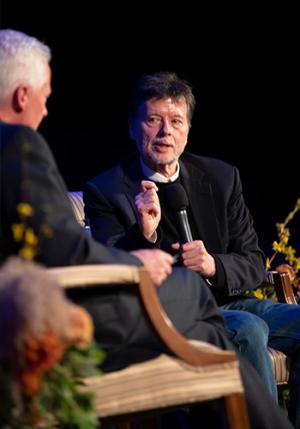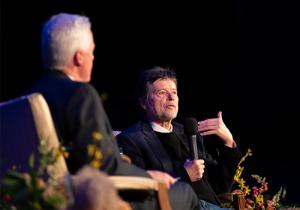What follows here are some edited excerpts from the conversation between Dr. Gary Bouchard and Ken Burns on April 30. If you have not yet had the chance to do so, we encourage you to listen to the entire conversation
On the Humanities

Gary: Are the humanities in this country in crisis, and if so, what does that mean and what do we do?
Ken: Well, I think it’s pretty obvious that when humanity itself is in crisis, which is pretty much all the time, that the humanities are a priori in crisis. But in fact, the humanities are thriving. We live in an era, particularly now, but it could be at any other time, when we have become economic units and not spiritual beings. And something has to rescue us from that, and the only thing we have to do that is the humanities. … Opposition to them has represented a kind of anti-intellectualism, and they’ve also supposedly been at odds with faith, and nothing could be further from the truth. … None of us gets out of here alive … and so it falls back to us, each and every one of us, [to ask] the central question[s] of ‘Who am I? What am I doing here? And what is my relationship and obligation to other people?’ And this is what the humanities tackles, in comparative religion, in history, in ethics, in every dimension of the humanities, we are wrestling with the central questions of right now, whether our consumer society wants to or not. That’s just simply what it is. …There are too many, hundreds of millions of people, suffering injustice and war, and we don’t have the immediate remedy, but we have the ability to work on ourselves and work together with others on ourselves—plural—and to try to make a difference. The candle will never go out. It just gets dimmer, it gets brighter, and it’s our job, each one of us, to make it brighter.
On Fame and Fortune
Gary: If documentary filmmaking had not brought you fame and fortune, if you were still making only a very modest salary at it, would you still be making documentary films?
Ken: I don’t know—I think the answer is yes. After The Civil War series came out, I would go places and have these fulsome introductions, every credit, every award, honorary degrees, all that sort of stuff, and I would go out and I would say, ‘Thank you for that generous introduction, but I feel compelled to inoculate myself because I have on my refrigerator an old and now-fading New Yorker cartoon, and it shows three men standing in hell, and one guy says to the other, ‘Apparently my over 200 screen credits didn’t mean a damn thing.’ It was an inoculation … for humility, to remind me that that is absolutely true. They don’t mean a damn thing. The little village I live in in New Hampshire is more interested in the content of my character than the length of my resumé. … After I had shot most of that first film on the Brooklyn Bridge, I was offered a very lucrative job in public broadcasting, and I watched myself put the film on the top of my refrigerator to take the job, and then woke up 30 years later and it was still there unedited. And so, I immediately turned down the job and moved to New Hampshire where I could live for nothing and heat my house with wood, and I fully expected that I was taking a vow of anonymity and poverty. And I had accepted that to be able to do what I wanted to do, and so I think I would still be doing it.
On History
Gary: You have said there’s nothing new under the sun. You have done things as a documentary filmmaker that are new, so tell me more about what you mean by that.
Ken: People like to say that history repeats itself. It never has, not once. Ecclesiastes … got it right. It says, ‘What has been will be again. What has been done will be done again. There’s nothing new under the sun.’ That tells us that human nature doesn’t change, that human nature superimposes itself over the seemingly random chaos of events. … Mark Twain is supposed to have said, ‘History doesn’t repeat itself, but it rhymes,’ which is fantastic! That’s exactly right! And so, what we do, we live out rhymes. … We can see these rhymes every day. There’s not a film I have worked on … where I have not … lifted up my head and said, ‘Oh, my God, it is speaking to the present’ … and that’s where the priceless gift of history comes in. It arms you in a way to understand, or at least put in perspective, the events that are going on right now.
On Faith and Doubt

Gary: Can you speak about the relationship between faith and doubt?
Ken: One morning, I was really struggling with something, and I had a thought, and it seemed to me that in conversations I had with people of faith and people without faith that … a dialectic had been set up, and that the opposite of faith was doubt. What Tolstoy had been able to open up in me one morning like a can of sardines was the idea … that the opposite of faith is certainty, and that doubt is a hugely important component of faith because it provides the means of testing it in the real world. … So, I found that doubt has been a really good friend in whatever search I’m involved in.
On Us vs. Them
Gary: Regarding prayer, you’ve said that before you can clean your house, you have to clean your own house first, and that when you clean your own house, you often find that it’s messier than when you started. How’s your house?
Ken: We’re working on it. It’s like that contractor who never shows up to do the last thing. We’re all really works in progress. Gary, there’s no communication in this world except among equals … and we tend to make the other person wrong, not ourselves. … So, I have been making films about the U.S. for 45, 50 years, but I have also been making films about us, the two-letter, lowercase plural pronoun. And that means all of the intimacy of us and we and our, and all of the majesty and complexity and contradiction of the U.S. … What I came to realize as I was working on Country Music is that there’s only us and there’s no them, and we spend an enormous amount of time distinguishing, do we not? All the time, red state-blue state, young-old, rich-poor, male-female, black-white, gay-straight, whatever it is, east-west, north-south. Everything’s a distinction, and none of those distinctions exist. None of those distinctions actually exist.
On Love
Gary: I know your favorite mathematical equation happens to be “Love multiplies.”
Ken: It’s my political yard sign in my yard year-round. It’s like, ‘Vote for Love Multiplies!’ It is, by the way, the only accurate equation in the universe. It holds up in every cosmological level. It does!
